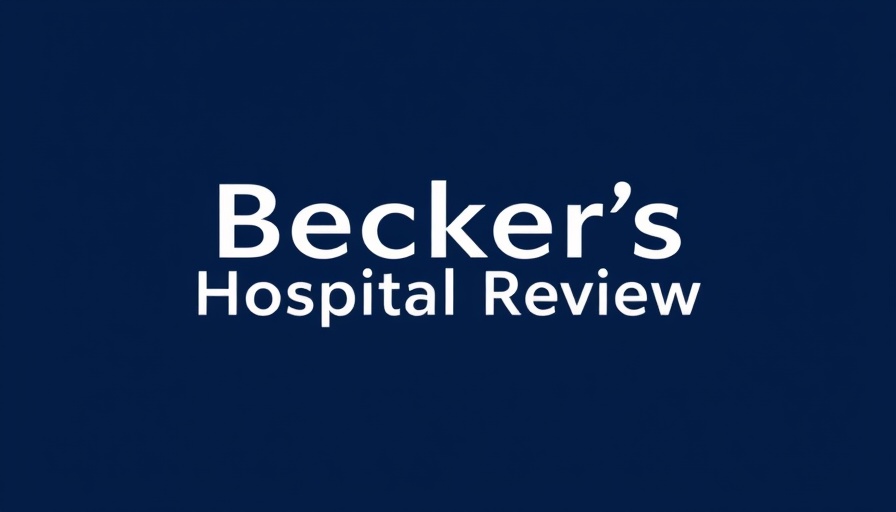
Revolutionizing Healthcare Workflows Through AI
The integration of AI in healthcare settings is transforming how clinicians manage their daily workloads, especially amidst rising regulatory demands and the intricacies of electronic health record (EHR) systems. Panelists at Becker's 2025 Annual Meeting discussed the pressing need for solutions that alleviate the administrative burden on healthcare providers. Voice recognition and AI-driven ambient documentation tools have emerged as key players in this movement, significantly reducing the time clinicians spend on documentation.
Tackling the Documentation Burden
As the complexities of clinical documentation continue to grow, healthcare professionals have found themselves caught in a web of regulatory requirements that often seem to detract from patient care. With many clinicians feeling overwhelmed during 'pajama time'—the hours spent completing patient charts after hours—the need for efficient documentation methods has never been more critical. Leaders like Susan Russell from Singing River Health have implemented programs focusing on removing non-value-added elements from EHRs, successfully reducing unnecessary alerts and freeing up time for clinicians to focus on patient interactions instead.
AI Tools Transforming Patient Care
Recent studies highlight the transformational potential of AI-driven documentation tools. According to a forthcoming MUSC Health study, the implementation of such technologies has led to a remarkable 27% reduction in weeknight 'pajama time' and a 35% decrease in weekend chart completion time. This technology not only alleviates cognitive burdens on clinicians but also enhances overall productivity, enabling professionals to devote more time to meaningful patient care. Dr. Erik Summers emphasized the need for a cultural shift within healthcare organizations, advocating for a focus on efficiency and quality of care to counter the escalating documentation challenges.
The Future of AI in Healthcare
As the healthcare landscape evolves, understanding how to strategically deploy AI technologies will be crucial. However, it isn't just about installing new tools; education and training for clinicians on using these systems effectively is paramount. Dr. Travis Bias pointed out that demonstrating short-term financial returns on AI investments remains a challenge, but health systems should consider broader benefits such as clinician retention and reduced burnout as essential metrics of success.
Overcoming Challenges in AI Implementation
While the benefits of AI in healthcare are clear, there are challenges to deploying these technologies effectively. Organizations must ensure they provide adequate training for clinicians, enabling them to leverage AI tools correctly. Additionally, careful planning is necessary to implement systems that align with existing workflows without adding further strain. Building a culture that embraces innovation while addressing concerns about the potential for dehumanization in care is vital.
Fostering an Adaptive Healthcare Environment
Health providers must foster an adaptive environment that embraces technological innovation while ensuring the needs of both patients and clinicians are met. Incorporating patient engagement tools and optimizing practice workflows will smooth transitions to automated systems, leading to enhanced care quality. Solutions like remote therapeutic monitoring (RTM) can further support clinicians by optimizing practice revenue and creating more streamlined communication channels with patients.
Embracing AI Solutions for Practice Optimization
Independent physicians and small practice owners can particularly benefit from these advancements. By optimizing their practices through healthcare automation and reducing administrative costs, they can focus more on delivering quality care. Finding a balance between technology and personal touch will be essential in maintaining strong patient relationships while improving operational efficiencies.
Conclusion: The Path Forward
The conversation around AI's role in unburdening clinicians is more than just a trend—it's a critical discussion shaping the future of healthcare. The insights shared during the Becker's panel discussion emphasize that embracing these technologies not only benefits healthcare providers but ultimately leads to improved patient care. As we move forward, it’s important for health systems to remain committed to investing in education and training, ensuring that every clinician is equipped to leverage AI effectively. This approach will pave the way for a healthier, more productive healthcare environment.
Now is the time for healthcare leaders and practitioners alike to embrace these insights and advocate for the necessary changes in their organizations. Step into the future of healthcare with AI solutions today!
 Add Row
Add Row  Add
Add 




 Add Row
Add Row  Add
Add 

Write A Comment